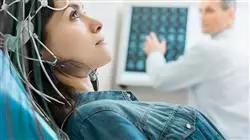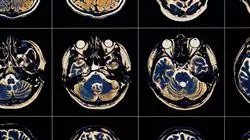University certificate
Scientific endorser

The world's largest faculty of physiotherapy”
Introduction to the Program
This training will generate a sense of confidence in the Physiotherapist’s professional practice, which will help them grow both personally and professionally”

In addition, we are living a time of great advances in the field of Neuroscience, as well as Physiotherapy as a science, which compels TECH to update students' knowledge both about the functioning of the nervous system, as well as how to evaluate and therapeutically approach a person with ABI, since each injury is different and will manifest itself in a different way in each patient.
This Professional master’s degree in Physiotherapy in the Approach to Acquired Brain Injury aims to be a compendium of the most up-to-date evidence and scientific knowledge of the nervous system and its rehabilitation when it is injured in a unexpected way. Thanks to this, it is presented as a Professional master’s degree capable of providing specialist training to physiotherapists who have never dealt with people with ABI, but who are interested in steering their professional future towards this type of patient.
Equally, professionals that are already neurological physiotherapists, whether or not they deal with ABI, will find the opportunity to update their knowledge and achieve a more advanced specialization in this type of patients.
In addition, by understanding so much information about Neuroscience and functionality, it can be a useful tool for the physiotherapist whose target patient is not specifically one suffering from an ABI or a neurological pathology, yet needs to know the ins and outs of the nervous system to better understand and address the injury or therapeutic need of the patient.
In this Physiotherapy in the Approach to Acquired Brain Injury, TECH also covers ABI in the pediatric age group, as this is an even greater challenge for physiotherapists. This is due to the specific characteristics of the nervous system and the body according to the neurodevelopment that has already happened or will happen depending on the age at which the injury occurs.
Update your knowledge through this Professional master’s degree in Physiotherapy in the Approach to Acquired Brain Injury”
This Professional master’s degree in Physiotherapy in the Approach to Acquired Brain Injury contains the most complete and up-to-date scientific program on the market. The most important features include:
- More than 75 case studies presented by experts in Physiotherapy in the Approach to Acquired Brain Injury
- The graphic, schematic, and practical contents with which they are created provide scientific and practical information on the disciplines that are essential for professional practice
- Recent developments on the role of the Physiotherapist
- Practical exercises where the self-evaluation process can be carried out to improve learning
- Algorithm-based interactive learning system for decision-making in the situations that are presented to the student
- With special emphasis on evidence-based Physiotherapy and research methodologies in Physiotherapy in the Approach to Acquired Brain Injury
- All of this will be complemented by theoretical lessons, questions to the expert, debate forums on controversial topics, and individual reflection assignments
- Content that is accessible from any fixed or portable device with an Internet connection
This Professional master’s degree may be the best investment you can make when choosing a refresher program for two reasons: in addition to updating your knowledge of Physiotherapy in the Approach to Acquired Brain Injury, you will obtain a qualification from TECH Global University”
Its teaching staff includes professionals from the field of Physiotherapy in the Approach to Acquired Brain Injury, who bring the experience of their work to this training, as well as renowned specialists belonging to leading scientific societies.
The multimedia content developed with the latest educational technology will provide the professional with situated and contextual learning, i.e., a simulated environment that will provide an immersive training program to train in real situations.
This program is designed around Problem Based Learning, whereby the professional must try to solve the different professional practice situations that arise during the academic program. For this reason, you will be assisted by an innovative, interactive video system created by renowned and experienced experts in the field of Physiotherapy in the Approach to Acquired Brain Injury with extensive teaching experience.
This Professional master’s degree offers learning in simulated environments, which provides an immersive learning experience designed to train for real-life situations"

It includes clinical cases to bring the program's degree as close as possible to the reality of medical care"
Why study at TECH?
TECH is the world’s largest online university. With an impressive catalog of more than 14,000 university programs available in 11 languages, it is positioned as a leader in employability, with a 99% job placement rate. In addition, it relies on an enormous faculty of more than 6,000 professors of the highest international renown.

Study at the world's largest online university and guarantee your professional success. The future starts at TECH”
The world’s best online university according to FORBES
The prestigious Forbes magazine, specialized in business and finance, has highlighted TECH as “the world's best online university” This is what they have recently stated in an article in their digital edition in which they echo the success story of this institution, “thanks to the academic offer it provides, the selection of its teaching staff, and an innovative learning method aimed at educating the professionals of the future”
A revolutionary study method, a cutting-edge faculty and a practical focus: the key to TECH's success.
The most complete study plans on the university scene
TECH offers the most complete study plans on the university scene, with syllabuses that cover fundamental concepts and, at the same time, the main scientific advances in their specific scientific areas. In addition, these programs are continuously being updated to guarantee students the academic vanguard and the most in-demand professional skills. In this way, the university's qualifications provide its graduates with a significant advantage to propel their careers to success.
TECH offers the most comprehensive and intensive study plans on the current university scene.
A world-class teaching staff
TECH's teaching staff is made up of more than 6,000 professors with the highest international recognition. Professors, researchers and top executives of multinational companies, including Isaiah Covington, performance coach of the Boston Celtics; Magda Romanska, principal investigator at Harvard MetaLAB; Ignacio Wistumba, chairman of the department of translational molecular pathology at MD Anderson Cancer Center; and D.W. Pine, creative director of TIME magazine, among others.
Internationally renowned experts, specialized in different branches of Health, Technology, Communication and Business, form part of the TECH faculty.
A unique learning method
TECH is the first university to use Relearning in all its programs. It is the best online learning methodology, accredited with international teaching quality certifications, provided by prestigious educational agencies. In addition, this disruptive educational model is complemented with the “Case Method”, thereby setting up a unique online teaching strategy. Innovative teaching resources are also implemented, including detailed videos, infographics and interactive summaries.
TECH combines Relearning and the Case Method in all its university programs to guarantee excellent theoretical and practical learning, studying whenever and wherever you want.
The world's largest online university
TECH is the world’s largest online university. We are the largest educational institution, with the best and widest online educational catalog, one hundred percent online and covering the vast majority of areas of knowledge. We offer a large selection of our own degrees and accredited online undergraduate and postgraduate degrees. In total, more than 14,000 university degrees, in eleven different languages, make us the largest educational largest in the world.
TECH has the world's most extensive catalog of academic and official programs, available in more than 11 languages.
Google Premier Partner
The American technology giant has awarded TECH the Google Google Premier Partner badge. This award, which is only available to 3% of the world's companies, highlights the efficient, flexible and tailored experience that this university provides to students. The recognition as a Google Premier Partner not only accredits the maximum rigor, performance and investment in TECH's digital infrastructures, but also places this university as one of the world's leading technology companies.
Google has positioned TECH in the top 3% of the world's most important technology companies by awarding it its Google Premier Partner badge.
The official online university of the NBA
TECH is the official online university of the NBA. Thanks to our agreement with the biggest league in basketball, we offer our students exclusive university programs, as well as a wide variety of educational resources focused on the business of the league and other areas of the sports industry. Each program is made up of a uniquely designed syllabus and features exceptional guest hosts: professionals with a distinguished sports background who will offer their expertise on the most relevant topics.
TECH has been selected by the NBA, the world's top basketball league, as its official online university.
The top-rated university by its students
Students have positioned TECH as the world's top-rated university on the main review websites, with a highest rating of 4.9 out of 5, obtained from more than 1,000 reviews. These results consolidate TECH as the benchmark university institution at an international level, reflecting the excellence and positive impact of its educational model.” reflecting the excellence and positive impact of its educational model.”
TECH is the world’s top-rated university by its students.
Leaders in employability
TECH has managed to become the leading university in employability. 99% of its students obtain jobs in the academic field they have studied, within one year of completing any of the university's programs. A similar number achieve immediate career enhancement. All this thanks to a study methodology that bases its effectiveness on the acquisition of practical skills, which are absolutely necessary for professional development.
99% of TECH graduates find a job within a year of completing their studies.
Professional Master's Degree in Physiotherapy in the Approach to Acquired Brain Injury
To adequately carry out the treatment of injuries that occur in the structure of the brain, it is necessary to have a series of theoretical and practical skills in the management of the intervention. Taking into account that, at TECH Global University, one of our main objectives is to update and specialize professionals, we have created this program focused on neurological rehabilitation. The curriculum covers, specifically, the physiological anatomy of this system, the symptomatology of functional alterations, assessment guidelines, therapeutic approaches and the complications that pediatric and geriatric patients may experience, whether or not they are in an altered state of consciousness. Thanks to the path proposed by our teaching team, it will be possible to develop analytical-interpretative skills for the elaboration and reading of complex clinical histories, to strengthen technical skills for the performance of radiological tests (such as CT and MRI) and to outline knowledge in the evaluation of pathological reflexes.
Professional Master's Degree in Physiotherapy in the Approach to Acquired Brain Injury
With this TECH postgraduate course, professionals in this area will have the opportunity to fully immerse themselves in the processes of diagnosis, prescription and rehabilitation of lacerations and trauma that cause the deterioration of the main organ of the nervous system. Through the methodology of case analysis and problem-based learning, which prepares them for the exercise of their daily work, they will be able to face all types of medical conditions, adequately mobilizing the resources available for review (neurological examination, complementary tests, assessment scales), therapy (cognitive exercises, healthy side restriction, dry needling for spasticity, hydro and electrotherapy) and follow-up (protocols for review of objectives). With the background obtained here, they will also be able to plan differential approaches, adjusted to the patient's age and taking into account neurological findings concerning the physiology of movement and motor control. Thus, graduates of this Professional Master's Degree, experts in the physiotherapeutic management of this disability, will be empowered both for the definition of different cognitive domains and the design and implementation of programs for the restoration of functions, as well as for the development of risk prevention guidelines.







